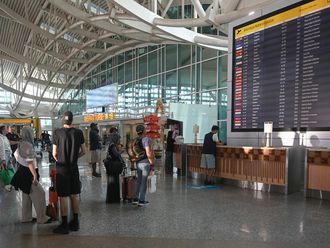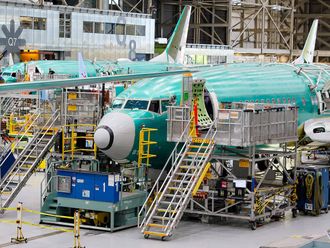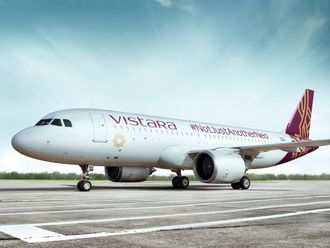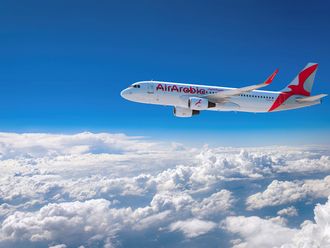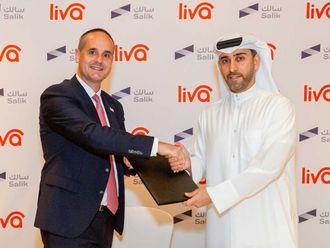Dubai: The Iraqi government is approving master plans for airport investment around the country as it seeks to attract more airlines.
A vision for the expansion of Baghdad International Airport (BIAP) has been in place since 2005, but the government has approved the master plan, said Dr Adnan Blebil, director-general of the Iraqi Civil Aviation Authority.
The plan doubles the size of the current airport and will add another three terminals, a two-and-a-half, and three-and-a-half square kilometre cargo village and free zone respectively.
A business park of one-and-a-half square kilometres will include conference and exhibition facilities, malls, hotels and the like.
Connections to the existing rail and highway network just 1km away and an Aviation Academy are also afoot. The eventual expansion would create 70,000 jobs and, potentially, yearly revenues of $2 billion (Dh7.34 billion).
"We've had interest from different groups over the years but nothing concrete yet. Anyone who is serious can start immediately. The airport is a very secure area surrounded by the military, ideal to invest in," Blebil said.
Security is still on the minds of many potential investors.
"We need investors with courage and money," Blebil joked, adding that now is the right time to start investing as better security and an investment law are in place.
The recent elections may have ended up in a hung parliament, but they managed to show that democracy is alive and well in the country which is headed in the right direction.
Diverse society
"It is still an ‘either you or us' position. The major players in parliament need to get their act together and this will play out for [the] years to come, we're a diverse society," said Luay Al Khateeb, founder and executive director of the Iraq Energy Institute.
He was speaking at a seminar organised by Al Tamimi & Company in Dubai and if one goes by the attendance, the interest to invest in the country is tremendous.
"Especially considering only a few in the room had been to Iraq," said Lawrence Peter, who heads the Private Security Company Association of Iraq.
He sees the country becoming more and more stable.
"The security situation will normalise within the next couple of years. How much is anyone's guess. Criminal activity exists all over the world. But the politics are going fantastic. Hotspots will always exist," he said.
Security companies come in large numbers in Iraq: 111 have applied to be registered and 80 of them already are. Of those, 54 are Iraqi and 26 are run by foreigners but with Iraqi personnel as well.
The best way for anyone wanting to do business and needing security, whether on a boutique or larger level, is to contact the association for independent recommendation, Peter added.
"Corruption and security risks [are] the least of our concerns. We're a difficult country because people are misunderstood. They were frustrated not to be able to rule themselves but now the chance is there," Al Khateeb said.
He called for further economic reforms, the building up of lacking capacity in government as well as the promulgation of laws, in particular related to the oil and gas business.
However, the latter has more than one deal which is criticised for non-transparency. Shell is one of them, he said.
Trust
"People need to trust government, and we as a country need to be understood and understand our neighbours," he added.
Blebil meanwhile is travelling to the other five airports in the country, including Basra, Erbil and Najaf to establish master plans.
Within a few months they could be ready for investment, and more so, investor interest up-front would speed things up, he said.
"We would also like to convert military airports to civilian ones. Airports are an important investment but can wait for foreign investors.
"As a government we only have enough money to cover social infrastructure, which needs immediate attention," Belbil said.
Several regional and international airlines already fly to Iraq, mainly Erbil. Etihad services the route and Emirates is starting flights to Baghdad on July 1 while Lufthansa is set to follow suit.
Several opportunities
Reconstruction in the oil and gas sector currently amounts to a staggering $600 billion (Dh2.2 trillion) of investment opportunities. Oil and gas exploration functions via production sharing agreements with international oil companies (IOC).
"The national oil company takes a minority share of the deals but in reality the IOCs [are] running the show. Iraq could produce as much as 12 million barrels but in reality there is only demand for half of that," Luay Al Khateeb, founder and executive director of the Iraq Energy Institute, said.
He warned about an over-reliance on oil and urged investors to know how to communicate with Iraqis for their own success.
He said there are issues with people getting used to a federal government system. He said the Kurdistan Regional Government, for example, was in charge of managing its oil production but said the oil should feed back into the national system, with the revenue belonging to all Iraqis.
"The system is not working yet. But we're trying to achieve in seven years what Saudi did in 70," he said.


